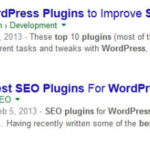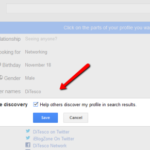Everybody has been talking about the importance of implementing the Google Authorship markup. Some say that it is an important ranking signal, and some say that improves CTR (Click Through Rates). While all the buzz surrounding the use of “rel=author” is widespread, I actually never saw a specific video from Matt Cutts (Google WebSpam Chief) talking about it (see video below).
What is Authorship Markup?
Let’s see if we can answer this question in a very simple way. This is what happens when you have your authorship claimed.
As you can see, the markup is a way of Google to show within the search results who’s the author of the content on a specific page. Usually, you will see the authors photo, a link to G+ profile, number of circles, etc..
[note]UPDATE: September 2014 – Authorship no longer is as important as it used to be. Read more here.[/note]
How To Claim Your Authorship
Claiming your Google authorship was quite complicated to implement some time ago. Today, it is actually simple, and one can easily implement it by using a WordPress plugin, doing it via email, or simply following this simple set of claiming your authorship instruction. The only catch is that you MUST HAVE a Google+ profile.
If you were ever in doubt on implementing authorship, watch this video as it may change your mind. After that, there are some key notes that I took from what Matt had to say.
Will Google be evaluating the use of rel=”author” moving forward?
There you go. If is was not important before, I guess that after watching the video, the answer to the question about its importance is pretty much straight forward. I’m curious as to how the “rel=publisher” will work, but that seems to be another issue that Matt will talk about, hopefully in the very near future. We’ll see.
Google Authorship Key Notes
- Matt is very excited about the rel=author program
- Moving from an anonymous web to some sort of identity
- A lot of benefits “for free”
- Continue to improve on how they handle that “signal”
- Moving to a richer and more annotated web
- Philosophy of Google “moving away from keywords or strings” to “things” – this can be big??
- Knowing who the “real author” is on a real world helps improve search quality
- Continue to see how the rel=”author” can be use to improve user search experience
So, what do you think. Are these all signs that authorship has important SEO benefits or that the so called Author Rank will actually exist, now or in the future? I’m guessing that it will be, in one way or another. So don’t neglect this one, if you are into search rankings.
Have you implemented your authorship yet? What are you waiting for? Do you think that it is important to have your Google authorship claimed?





![Rich Snippets and Authorship: Implementation and Benefits [infographic]](https://www.iblogzone.com/wp-content/uploads/2012/09/Authorship-and-Rich-Snippets-150x150.jpg)




Comments are closed.